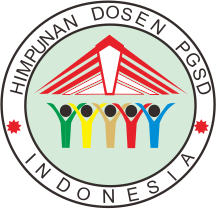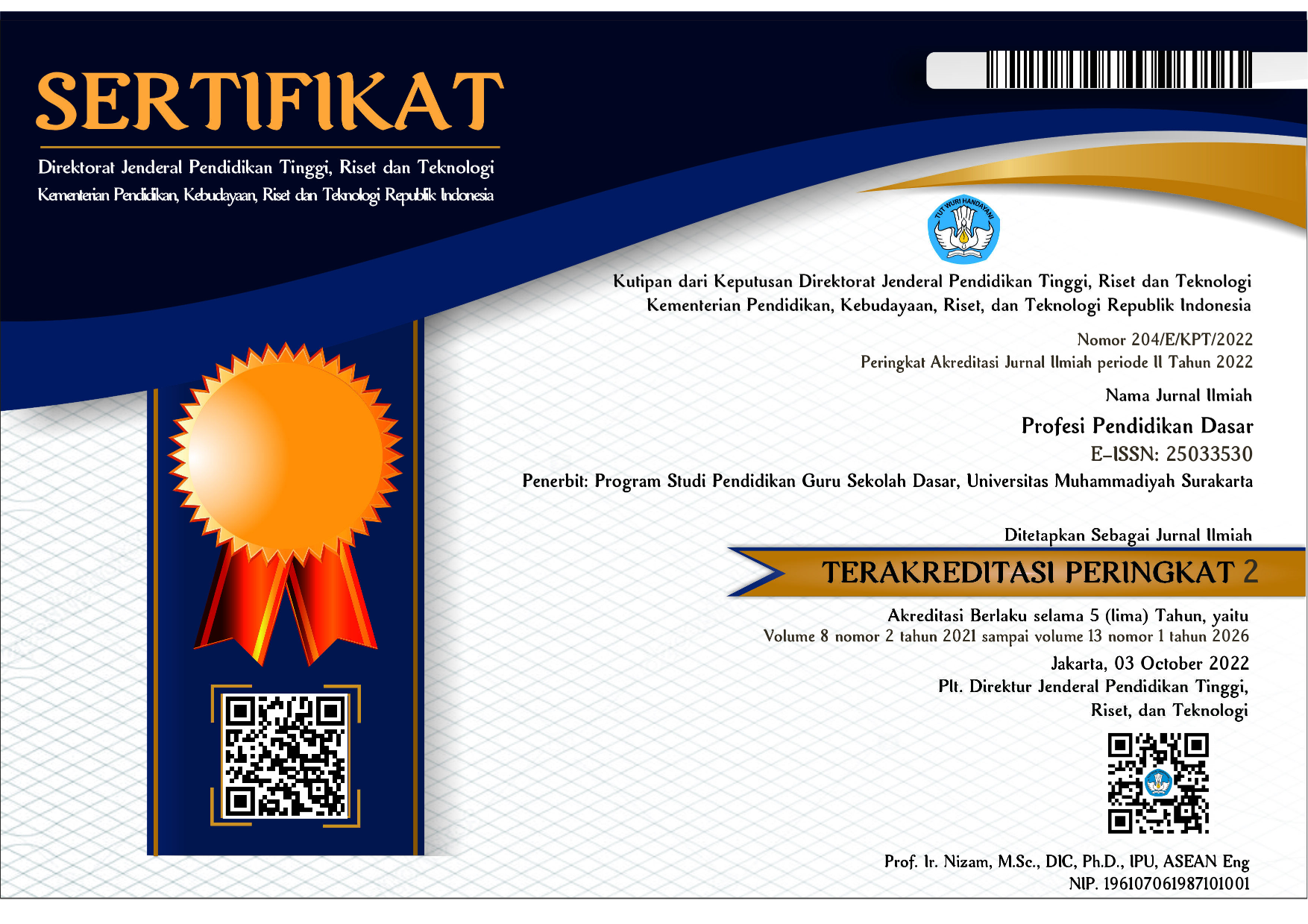Information and Communication Technology in Elementary Schools: A Comparison Between Hybrid and Face-to-Face Learning Systems
Wisnu Zakaria(1*), Turmudi Turmudi(2), Jupeth Toriano Pentang(3)(1) Indonesia University of Education
(2) Indonesia University of Education
(3) Western Philippines University
(*) Corresponding Author
Abstract
Keywords
Full Text:
PDFReferences
Aldiyah, E. (2021). Perubahan Gaya Belajar di Masa Pandemi Covid-19 [Learning Style Changes during the Covid-19 Pandemic]. CENDEKIA: Jurnal Ilmu Pengetahuan , 1(1), 8-16. https://doi.org/10.51878/cendekia.v1i1.24.
Bryan, A., & Volchenkova, K. (2016). Bleanded Learning: Definition, Models, Implications. Bulletin of the South Ural State University. Ser. Education. Educational Sciences, 8(2), 24–30. https://doi.org/10.14529/ped160204.
Chirino-Barceló, V., & Molina, A. (2011). Critical Factors in Defining the Mobile Learning Model. Handbook of Research on Mobility and Computing, 774–792. https://doi.org/10.4018/978-1-60960-042-6.ch048.
Hariadi, Asriati, N., & Achmadi. (2016). Pemanfaatan Teknologi Informasi dan Komunikasi Terhadap Hasil Belajar pada Mata Pelajaran Ekonomi di SMA [Utilization of Information and Communication Technology on Learning Outcomes in Economics Subjects in Senior High School]. Jurnal Pendidikan dan Pembelajaran Khatulistiwa (JPPK), 5(10), Retrieved from https://jurnal.untan.ac.id/index.php/jpdpb/article/view/17130/0.
Hediansah, D., & Surjono, H. D. (2020). Hybrid Learning Development to Improve Teacher Learning Management. Jurnal Kajian Teknologi Pendidikan, 3(1), 1-9. http://doi.org/10.17977/um038v3i12019p001.
Ismaili, A. A. (2021). ICT Use in the EFL Classroom in Morocco: EFL Teachers' Personal and Technology-Related Variables. International Journal of Information and Communication Technology Education (IJICTE), 18(1), 1-13. https://doi.org/10.4018/ijicte.286759.
Koehler, M. J., Mishra, P., Akcaoglu, M., & Rosenberg, J. (2013). The Technological Pedagogical Content Knowledge Framework for Teachers and Teacher Educators. ICT Integrated Teacher Education, 1-7. Retrieved from http://www.matt-koehler.com/publications/Koehler_et_al_2013.pdf
Lestari, K. E., & Yudhanegara, M. R. (2018). Penelitian Pendidikan Matematika [Mathematics Education Research]. Bandung: Refika ADITAMA.
Lestari, S. (2018). Peran Teknologi dalam Pendidikan di Era Globalisasi [The Role of Technology in Education in the Era of Globalization]. Edureligia: Jurnal Pendidikan Agama Islam, 2(2), 93-100. https://doi.org/10.33650/edureligia.v2i2.459.
Malelak, E. O., Taneo, J., & Ufi, D. T. (2021). Problems of Online Learning During the Covid-19 Pandemic in Generation Z. Paedagoria: Jurnal Kajian, Penelitian dan Pengembangan Kependidikan, 12(1), 115-121. Retrieved from https://journal.ummat.ac.id/index.php/paedagoria/article/view/4044.
Pentang, J. T. (2021). Impact Assessment and Clients’ Feedback towards MATHEMATICS Project Implementation. International Journal of Educational Management and Development Studies, 2(2), 90-103. https://doi.org/10.53378/346107.
Prihadi, S., Sajidan, Siswandari, & Sugiyanto. (2021). The Challenges of Application of The Hybrid Learning Model in Geography Learning During The Covid-19 Pandemic. GeoEco, 7(3), 233-243. https://doi.org/10.20961/ge.v8i1.52205.
Purnamawati, Arfandi, A., & Nurfaeda. (2019). The Level of Sse of Information and Communication Technology at Vocational High School. Jurnal Pendidikan Vokasi, 9(3), 249-257. https://doi.org/10.21831/jpv.v9i3.27117.
Rorimpandey, W. H., & Midun, H. (2021). Effect of Hybrid Learning Strategy and Self-Efficacy on Learning Outcomes. Journal of Hunan University (Natural Sciences), 48(8), 181-189. Retrieved from http://jonuns.com/index.php/journal/article/view/672.
Saadjad, D. Y., Hatibe, A., & Saehana, S. (2016). Perbandingan Metode Pembelajaran Blended Learning Menggunakan Powerpoint dipandu Animasi [Comparison of Blended Learning Methods Using Powerpoint Guided Animation]. Jurnal Sains dan Teknologi Tadulako, 5(2), 35-44. Retrieved from http://jurnal.untad.ac.id/jurnal/index.php/JSTT/article/view/6969.
Setyaningrum, A., Rahmasari, F., Zulfinanda, U., & Safitri, P. T. (2021). Pengaruh Media Pembelajaran Online terhadap Hasil Belajar Siswa pada Masa Pandemi Covid-19 [The Effect of Online Learning Media on Student Learning Outcomes during the Covid-19 Pandemic]. Jurnal Gammath, 6(1), 40-46. https://doi.org/10.32528/gammath.v6i1.5396.
Slameto. (2014). Belajar dan Faktor-faktor yang Mempengaruhinya [Learning and the Factors That Affect It]. Jakarta: Rineka Cipta.
Sugiyono. (2018). Statistik Nonparametris untuk Penelitian [Nonparametric Statistics for Research]. Bandung: Alfabeta.
Suminar, D. (2019). Penerapan Teknologi sebagai Media Pembelajaran pada Mata Pelajaran Sosiologi [Application of Technology as Learning Media in Sociology Subjects]. Prosiding Seminar Nasional Pendidikan FKIP, 2(1), 774-783. Retrieved from https://jurnal.untirta.ac.id/index.php/psnp/article/download/5886/4220.
Sunarto, S. (2011). Pembelajaran Berbasis Komputer [Computer Based Learning]. Retrieved from http://staffnew.uny.ac.id/upload/131568300/penelitian/PEMBELAJARAN+BERBANTUAN+KOMPUTER-2.pdf
Suwardana, H. (2018). Revolusi Industri 4. 0 Berbasis Revolusi Mental [Industrial Revolution 4.0 Based on Mental Revolution]. JATI UNIK: Jurnal Ilmiah Teknik dan Manajemen Industri, 1(1). 102. https://doi.org/10.30737/jatiunik.v1i2.117.
Verawati, & Desprayoga. (2019). Solusi Pembelajaran 4.0: Hybrid Learning [Learning Solution 4.0: Hybrid Learning]. Prosiding Seminar Nasional Pendidikan Program Pascasarjana Universitas PGRI Palembang, 1183-1192. Retrieved from https://jurnal.univpgri-palembang.ac.id/index.php/Prosidingpps/article/view/2739
Article Metrics
Abstract view(s): 1184 time(s)PDF: 1097 time(s)
Refbacks
- There are currently no refbacks.


















